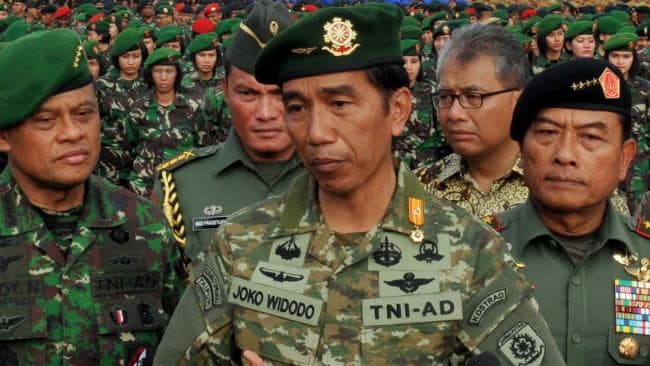As most have predicted, the 2019 presidential election is a repetitious 2014 move. Only this time, both candidates – Joko Widodo & Ma’ruf Amin and Prabowo Subianto & Sandiaga Uno – has everything to lose.
During Jokowi’s administration, we see the triumph of Islamists conservatism and political identity; a snowball effect since the 212 rally in Jakarta during the 2017 Jakarta’s governor election. Jokowi’s electoral integrity is refrained,and he needs to be well-prepared for battle once again, against Prabowo’s third time running in the presidential election, which can only assert that everything is on the line. At this point, this is a: do or do not. There is no try.
Other than the identity sentiment, a few media reports have shown that the campaign for 2019 presidential election is fused by civil-military power in both candidates. As Majalah Tempo investigated, besides an official campaign team and voluntary mass participation, ‘shadow teams’ are also counted as prominent players. Both candidates are found to be supported by shadow teams affiliated in, one way or another, to the military institution. To note, these teams are not registered as official campaignteams, and therefore, no KPU decisions or rules can apply yet.
Such assumptions can be examined by, one, Prabowo’s pick on ex-commander of TNI, Djoko Santoso to be the chief of the campaign team, also joined by Prabowo’s military associates. Two, Moeldoko, now co-lead Jokowi’s campaign team alongside businessman Erick Thohir. Regarding this matter, on January 2018 CSIS’ very own, Arya Fernandes has predicted that appointing Moeldoko, a former Commander in Chief of TNI, as Chief of Presidential Staff (KSP) is to secure Jokowi’s position in 2019; what Arya said has stayed corrected.
Asia Times, one of the first media to have reported Jokowi’s campaign strategy, mentioned that Luhut Binsar Panjaitan, a former general and key player since Jokowi’s campaign in 2014, established two teams consisting of military retirees. Not only Panjaitan has a major role during Jokowi’s 2014 campaign and his administration afterwards but also is rumored to be the President’s closest ally. To be exact, Panjaitan and other retired military generals who now holds a position in Kabinet Kerja, are associated with Megawati during her tenure as president.
The role of high-ranking retirees endorsing presidential candidates is common practice. On a separate note, New Mandala reported on the neutrality of TNI in the upcoming election year. Thus, the remaining question is, to what extent can military influences have power over civil institutions, in particular on practical politics.
Ever since the fall of Orde Baru, military members are constrained to take part in the political system. There are two main national regulations on limiting military and police roles, namely: Tap MPR No. VI/MPR/2000 on separation ofTNI and Polri and Act No. 34/2004 (UU No. 34/2004) on TNI. Both frameworks are aimed to eradicate the ‘dual-function’ doctrine of TNI. Reiterated by both Jokowi and Moeldoko, all active military officers must remain neutral on matters surrounding practical politics, but not including retirees.
So, there is adark side of the force, after all.
As far as history is concerned, the military holds a pivotal role in a democratic Indonesia we have today. As one may argue, a step to democratization is to sustain a healthy civil-military relation in a sociopolitical sphere. I believe to start limiting military influences in civil institutions and vice versa, we need to set a strict boundary between both institutions, in which no intervention is permitted; however, this does not deny the influence of each institution brings to the other.
On one side, I cannot contradict to the idea of a balanced military influence in the political system. On another, I tried to dissect the roles and impacts of retirees-turned-politicians. So, I would opine that, one, retirees are encouraged to participate actively in politics, at least in exercising their right to vote in elections.
Indeed, as further researched by RAND (2002), their candidacy for office or in a non-military government position, either backed by partisan politics or by other means, are still present to this day. What triggers the public for opting in former military elites are caused by the distrust on the current political dynamics and indecisive politicians, whereas individuals with military backgrounds has a reputation of opposing the latter.
Two, for dismantling the ‘dual-function’ perception, retirees involved in politics must not imply any indication on their past professional background in the military. Particularly, when running or campaigning for office, they have to uphold their social status as civilian, and not officers. As impossible as it may seem, the strong emotional links between TNI as an institution and its former and active members is hard to disregard. The forcewill be with them, always.
Three, in responding and contributing advice, ex-military members are most likely to take a pragmatist approach. Having experienced in strategies planning in field operations, officers are also familiar with military management. This viewpoint can be considered as an advantage in comprehending political affairs. Relating to that, when it comes to endorsing presidential candidates, they can provideterritorial-based information and intelligence-gathering, to say the least.
Four, the long-awaited reform on TNI might take a little longer than expected. Post-Suharto era, the withdrawal of TNI from bureaucratic positions has contributed to a democratic Indonesia, and as a consequence, a distinct separation between civil and military institutions. However, their social and political roles in society are still deeply-rooted. Further, the emergence of former high-ranking military officers in politics had gained popularity and successes; Yudhoyono’s significant rise to power in 2004 backed by the Democratic Party speaks for itself.
All in all, based on the arguments above, I posited that military influence in politics has been here long and is here to stay. The force runs too strong in this one.

